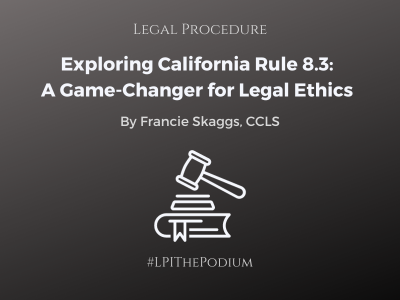
California Rule of Professional Conduct 8.3
By Francie Skaggs, CCLS
On August 1, 2023, California introduced Rule of Professional Conduct 8.3 (hereinafter “Rule 8.3”), a significant addition to the state’s legal framework that aims to enhance transparency and accountability within the legal profession. This rule introduces mandatory reporting requirements for attorneys, potentially reshaping the way ethical violations are handled in the state. In this blog post, we will delve into the key aspects of Rule 8.3 and its potential impact on legal practitioners and the broader legal community.
Understanding Rule 8.3
Rule 8.3, officially titled “Reporting Professional Misconduct,” places a legal obligation on attorneys to report certain ethical violations committed by fellow attorneys. This rule stems from the principle that maintaining the integrity and reputation of the legal profession is of paramount importance to the administration of justice.
Key Components of Rule 8.3
- Mandatory Reporting Requirement:
Under Rule 8.3, attorneys are obligated to report any knowledge of serious ethical violations by other attorneys. This includes conduct that raises substantial questions regarding a lawyer’s honesty, trustworthiness, or fitness to practice law.
There are two ways to report. The first is through the online complaint form found on the state bar website, the second is tribunal, meaning a court, administrative law judge, or other governing entity, as long as it is the applicable jurisdiction.
- Scope of Reportable Conduct:
Rule 8.3 applies to a wide range of more serious professional misconduct, such as theft or embezzlement of client funds, substantial misrepresentation, or any other serious ethical violations. It does not include other unethical conduct of an attorney such as not returning client phone calls promptly.
- Timely Reporting:
Attorneys are expected to promptly report any instances of misconduct. The rule emphasizes the importance of acting swiftly to ensure the integrity of the legal profession is upheld.
- Protection for Whistleblowers:
Rule 8.3 includes safeguards to protect attorneys who report misconduct from any adverse consequences. This encourages a culture of accountability without fear of retaliation.
- Confidentiality of Reporting:
While the duty to report is mandatory, the rule also respects the confidentiality of the reporting process, ensuring that the reporting attorney’s identity is kept confidential to the extent permitted by law.
Potential Impact on the Legal Community
- Enhanced Accountability:
Rule 8.3 aims to create a culture of accountability within the legal community. By making reporting mandatory, the rule ensures that ethical violations are not swept under the rug.
- Strengthening Professional Standards:
This rule sets a higher standard for ethical behavior within the legal profession, reinforcing the importance of integrity, trustworthiness, and professionalism.
- Restoring Public Trust:
By holding attorneys to a higher level of accountability, Rule 8.3 works to rebuild and maintain public trust in the legal system, crucial for the effective functioning of the justice system.
- Potential Challenges:
While the rule represents a positive step forward, there may be challenges in its implementation, including the potential for false or malicious reports, as well as concerns about potential conflicts of interest. However, false reports can also result in disciplinary action as well, which is something that might dissuade any whimsical reporting.
Rule 8.3 marks a significant milestone in the legal landscape of the state, reinforcing the commitment to upholding the highest ethical standards within the legal profession. By making reporting mandatory, the rule signals a shift towards a more transparent and accountable legal community. As legal practitioners adapt to this new framework, it is essential to recognize the potential benefits and challenges that may arise, ultimately striving for a legal system that instills confidence and trust in all stakeholders.
Are there any consequences for not reporting? Consequences for not reporting: A lawyer who fails to report conduct as required by rule 8.3 may be subject to disciplinary action by the State Bar.
For more information about this new rule, go to https://www.calbar.ca.gov/Attorneys/Conduct-Discipline/Ethics/Rule-83-Required-Reporting
Categorized in: Legal Procedure
| << previous | next >> |








